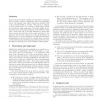114 search results - page 15 / 23 » Using likely program invariants to detect hardware errors |
144
click to vote
POPL
1997
ACM
15 years 6 months ago
1997
ACM
Type systems currently available for imperative languages are too weak to detect a significant class of programming errors. For example, they cannot express the property that a l...
108
click to vote
ICFP
2006
ACM
16 years 2 months ago
2006
ACM
A transient hardware fault occurs when an energetic particle strikes a transistor, causing it to change state. These faults do not cause permanent damage, but may result in incorr...
151
click to vote
HVC
2005
Springer
15 years 8 months ago
2005
Springer
Concurrent programs are notorious for containing errors that are difficult to reproduce and diagnose. A common kind of concurrency error is deadlock, which occurs when a set of thr...
123
click to vote
MICRO
2010
IEEE
15 years 11 days ago
2010
IEEE
Abstract--Parallel programming is hard, because it is impractical to test all possible thread interleavings. One promising approach to improve a multi-threaded program's relia...
136
click to vote
ISCA
2009
IEEE
15 years 9 months ago
2009
IEEE
Detecting data races in parallel programs is important for both software development and production-run diagnosis. Recently, there have been several proposals for hardware-assiste...

